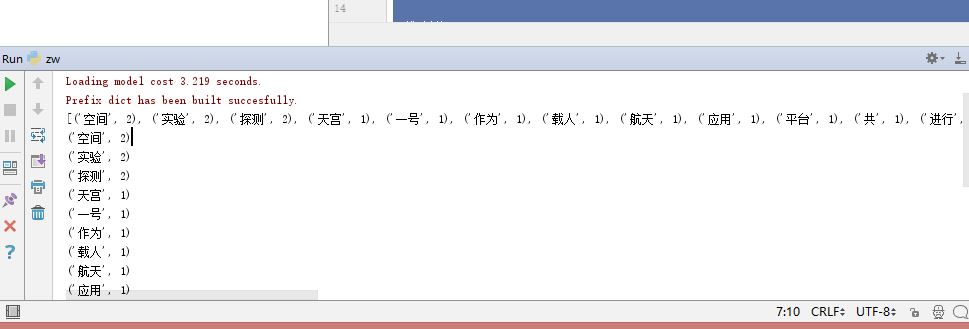综合练习:词频统计
综合练习
词频统计预处理
下载一首英文的歌词或文章
将所有,.?!’:等分隔符全部替换为空格
将所有大写转换为小写
生成单词列表
生成词频统计
排序
排除语法型词汇,代词、冠词、连词
输出词频最大TOP20
将分析对象存为utf-8编码的文件,通过文件读取的方式获得词频分析内容
f=open('text.text','r') new=f.read() f.close() sep='''.,?!'":''' exclude={'the','and','of','to'} for c in sep: new=new.replace(c,' ') wordList=new.lower().split() wordDisct={} wordSet=set(wordList)-exclude for w in wordSet: wordDisct[w]=wordList.count(w) dictList=list(wordDisct.items()) dictList.sort(key=lambda x:x[1], reverse=True) for c in range(20): print(c,dictList[c]);

2.中文词频统计
下载一长篇中文文章。
从文件读取待分析文本。
news = open('gzccnews.txt','r',encoding = 'utf-8')
安装与使用jieba进行中文分词。
pip install jieba
import jieba
list(jieba.lcut(news))
生成词频统计
排序
排除语法型词汇,代词、冠词、连词
输出词频最大TOP20(或把结果存放到文件里)
import jieba # 打开文件 file = open("zwwz", 'r', encoding="utf-8") notes = file.read(); file.close(); # 替换标点符号 sep = ''':。,?!;∶ ...“”''' for i in sep: notes = notes.replace(i, ' '); notes_list = list(jieba.cut(notes)); # 排除单词 exclude = [' ', '\n','、', '的', '了'] # 方法②,遍历列表 notes_dict = {} for w in notes_list: notes_dict[w] = notes_dict.get(w, 0) + 1 # 排除不要的单词 for w in exclude: del (notes_dict[w]); for w in notes_dict: print(w, notes_dict[w]) # 降序排序 dictList = list(notes_dict.items()) dictList.sort(key=lambda x: x[1], reverse=True); print(dictList) # 输出词频最大TOP20 for i in range(20): print(dictList[i]) # 把结果存放到文件里 outfile = open("top20.txt", "a") for i in range(20): outfile.write(dictList[i][0] + " " + str(dictList[i][1]) + "\n") outfile.close();



